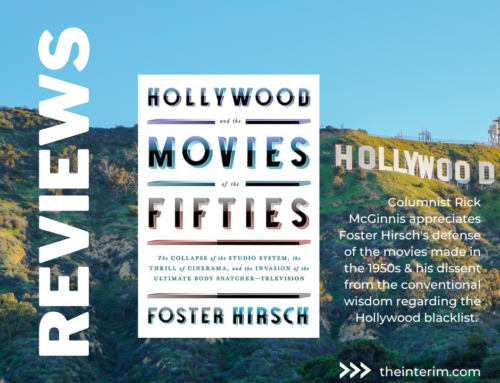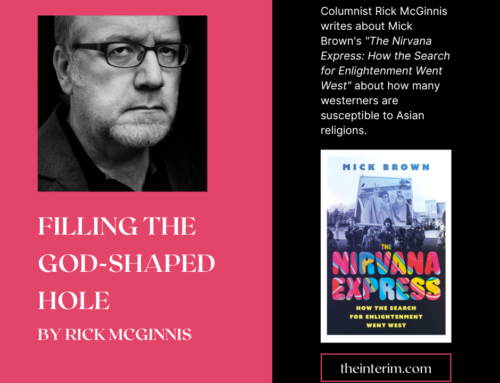 Roger Kimball is a well-read man. Reading through his latest book, The Fortunes of Permanence: Culture and Anarchy in an Age of Amnesia (St. Augustine’s Press, $36, 356 pages), I couldn’t help but envy whatever combination of discipline, habit, choice of profession and luck has let him trawl through the remainder tables of ideas and come up with a collection of essays that, in the most erudite of ways, informs us of just how doomed we are, and how we got that way.
Roger Kimball is a well-read man. Reading through his latest book, The Fortunes of Permanence: Culture and Anarchy in an Age of Amnesia (St. Augustine’s Press, $36, 356 pages), I couldn’t help but envy whatever combination of discipline, habit, choice of profession and luck has let him trawl through the remainder tables of ideas and come up with a collection of essays that, in the most erudite of ways, informs us of just how doomed we are, and how we got that way.
Kimball, the editor of the journal The New Criterion, has been covering this story for almost a quarter century, beginning in 1990 with his book Tenured Radicals: How Politics Has Corrupted Our Higher Education. His latest book seems aimed at a more select audience, based on its title – while words like “culture” and “anarchy” and “amnesia” might toy with our collective panic button, the title as a whole might glaze over the eyes of readers more easily tempted by books with titles like Liberty and Tyranny, Keep It Pithy and Demonic.
A series of essays divided into three sections, Kimball’s book is inspired by books and writers that were once canonical, but have slipped into footnote status or obscurity. There are chapters devoted to writers from the twilight of the British Empire, and to others who were public intellectuals in a now-bygone era, when that meant essays published in newspapers and magazines and fervent public debates, and not cryptic outbursts on Twitter studded with hashtags.
Kimball surveys a whole vast landscape of culture, from novels to art and architecture, as part of an attempt to perform a status check on where we are in a time when no one reads writers like Kipling, Chesterton and John Buchan, and intellectuals like James Burnham, Malcolm Muggeridge and Leszek Kolakowski have been nearly forgotten, not just because of their importance to the evolution of what’s now called conservatism, but because it’s doubtful that even their presumed conservative descendents would find them readable today.
Of the writers Kimball features, only a couple still get name-checked off or online today. Friedrich Hayek’s reputation has undergone a renaissance in the last decade or two, and while his Road to Serfdom is considered gospel by opponents of big government, it’s mentioned more than quoted – waved around like a Little Red Book by columnists and bloggers. It’s like those brick-like bestselling novels by writers like Thomas Pynchon and David Foster Wallace that were bought and shelved but rarely read.
Another writer Kimball returns to over the course of the book is Thomas Malthus, the British cleric whose Essay on the Principle of Population is regarded as the root stock of so many catastrophic scenarios today, from resource depletion and peak oil to climate change. The word “Malthusian” is now shorthand to evoke a ruined world of dry fields and starving hordes picking through the rocks and weeds, on the steep downward side of a population boom that ate the earth bare.
Kimball does us a great service by actually reading Malthus and realizing that he wasn’t the Cassandra-like figure of myth, and would have been appalled to find his name used to sell birth control and draconian measure of “family planning.” He was no alarmist, and was philosophically in violent opposition to the revolutionary pieties of his time – those utopian reformers and revolutionaries unleashed by the French Revolution whose ideological offspring Kimball sees at work today so successfully in the schools and the media, in publishing and politics.
The best part of the book is devoted to James Burnham, a Trotskyite who became one of the founding writers of conservative magazine National Review in the 1950s. Like the rest of the men discussed in Kimball’s book, he was once a major public intellectual and the author of a bestselling book, The Managerial Revolution, that echoed Hayek in raising alarms about the growth of the bureaucratic state, and its diminishing effect on personal liberty.
A fervent anti-Communist, Burnham was tarred with the McCarthyite brush and marginalized by mainstream conservatives who had been convinced to lose that battle and find pariahs. Kimball does a fine job of reviving Burnham’s memory and reputation, and opens up his character for a glimpse by noting his journey away – and ultimately back – to his Catholic upbringing.
“Being an ex-Catholic is not the same thing as being a non-Catholic,” Kimball writes, perceptively, “and an ex-Catholic with a taste for theological argumentation is a decidedly strange hybrid.”
Anyone with a taste for the hortatory pamphleteering that typifies today’s political bestsellers might have a hard time with a book like Kimball’s. I found myself picking it up in fits and starts, and only after fortifying myself for some mental effort, but keep in mind that Kimball has done far more of the heavy lifting ahead of you, and that his book is a primer of sorts, pulling together all the dropped threads and forgotten names whose undeserved obscurity have helped create what he rightly calls and age of amnesia.




